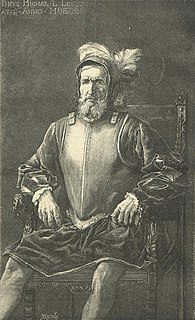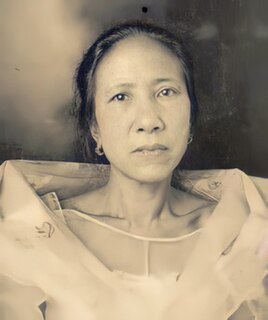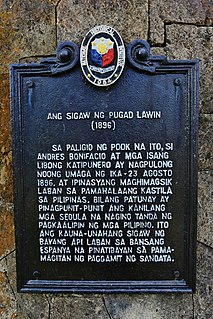Related Research Articles

Miguel López de Legazpi, also known as El Adelantado and El Viejo, was a Spanish navigator and governor who established the first Spanish settlement in the East Indies when his expedition crossed the Pacific Ocean from the Viceroyalty of New Spain in modern-day Mexico, arriving in Cebu in the Philippine Islands in 1565. He was the first Governor-General of the Spanish East Indies, which was governed from and mainly located in the Philippines. It also encompassed other Pacific islands namely Guam and the Mariana Islands. After obtaining peace with various indigenous nations and kingdoms, he made Cebu City the capital of the Spanish East Indies in 1565 and later transferred to Manila in 1571. The capital city of the province of Albay bears his name.

Noli Me Tángere is an 1887 novel by José Rizal during the colonization of the Philippines by the Spanish Empire, to describe perceived inequities of the Spanish Catholic friars and the ruling government.

Gomburza, alternatively stylized as GOMBURZA or GomBurZa, refers to three Filipino Catholic priests, Mariano Gomez, José Burgos, and Jacinto Zamora, who were executed by garrote on February 17, 1872, in Bagumbayan, Philippines by Spanish colonial authorities on charges of subversion arising from the 1872 Cavite mutiny. The name is a portmanteau of the priests' surnames.

El filibusterismo, also known by its alternative English title The Reign of Greed, is the second novel written by Philippine national hero José Rizal. It is the sequel to Noli Me Tángere and, like the first book, was written in Spanish. It was first published in 1891 in Ghent.
Sangley and Mestizo de Sangley are archaic terms used in the Philippines to describe a person of pure overseas Chinese ancestry and Mestizo de Sangley, which are mixed Chinese and native Filipino ancestry respectively during the Spanish Colonial Era in the Philippines. The Sangley Chinese were one of the preceding ancestral groups to both modern Chinese Filipinos and the modern Filipino mestizo descendants of the Mestizos de Sangley, who were mestizos under the Spanish Colonial Empire, classified together with other Filipino mestizos, such as the Mestizos de Español, the Tornatrás, the Mestizos de Bombay, Mestizos de Japóneses, etc.

Filipinos are the people who are citizens of or native to the Philippines. The majority of Filipinos today come from various Austronesian ethnolinguistic groups and non-native admixed immigrant groups, all typically speaking either Filipino (Tagalog) and/or English and/or other Philippine languages. Currently, there are more than 185 ethnolinguistic groups in the Philippines; each with its own language, identity, culture and history.

During the Spanish colonial period in the Philippines, 1521–1898, there were several revolts against the Spanish colonial government by indigenous Moro, Lumad, Indians, Chinese (Sangleys), and Insulares, often with the goal of re-establishing the rights and powers that had traditionally belonged to Lumad Timueys, Maginoo Rajah, and Moro Datus. Some revolts stemmed from land problems and this was largely the cause of the insurrections that transpired in the agricultural provinces of Batangas, Bulacan, Cavite, and Laguna. Natives also rebelled over unjust taxation and forced labor.

The Santa Isabel College, also referred to by its acronym SIC, is a private, Roman Catholic college owned and operated by the nuns of the Daughters of Charity in Ermita, Manila, in the Philippines. It was founded on 24 October 1632. Santa Isabel College is one of the oldest colleges in the Philippines and in Asia.
Juan de la Cruz, also known as Palaris, was a Pangasinan leader in the province of Pangasinan in the Philippines who led a revolt against the colonial authorities during the 18th century. The uprising is known as the Palaris Revolt.

The principalía or noble class was the ruling and usually educated upper class in the pueblos of the Spanish Philippines, comprising the gobernadorcillo, who was later referred to as capitán municipal, tenientes de justicia, and the cabezas de barangay, who governed the districts, former gobernadorcillos or municipal captains, and municipal lieutenants in good standing during their term of office.

Gregoria de Jesús y Álvarez, also known by her nickname Oriang, was the founder and vice-president of the women's chapter of the Katipunan of the Philippines. She was also the custodian of the documents and seal of the Katipunan. She married Gat Andrés Bonifacio, the Supremo of the Katipunan and President of the Katagalugan Revolutionary Government. She played a major and one of the important roles in the Philippine Revolution. After the death of Bonifacio, she married Julio Nakpil, one of the generals of the revolution. She had one son from Andrés Bonifacio and five children from Julio Nakpil.

Paco Catholic School is a co-institutional private school. The school is located in the district of Paco in the City of Manila, Philippines. Paco Catholic school started in 1912 as an informal class for a handful of young boys inside the chapel in the Peñafrancia section of the district by Rev. Fr. Raymond Esquenet, CICM. It is the largest parochial school in the Philippines and now serving approximately 5,000 students.

Assumption College San Lorenzo, formerly known as the Assumption Convent, is a private, Roman Catholic basic and higher education institution exclusively for girls run by the Religious of the Assumption in San Lorenzo Village, Makati, Philippines. It was established by the Assumption Sisters in 1958. Assumption San Lorenzo is the successor of the closed school named Assumption Convent which was located along Herran Street, Ermita, Manila. It provides education from pre-school, elementary, secondary, tertiary, to graduate level. The alumnae and present students of this school include daughters and granddaughters of Presidents, industrialists, politicians, actors/actresses and prominent figures in the Philippines.

Spanish Filipinos are an ethnic group who trace their ancestry to early Spanish settlers and more recent arrivals or via Mexico who settled in the Philippines during the 16th to 20th century.

The Cry of Pugad Lawin was the beginning of the Philippine Revolution against the Spanish Empire.
Makamisa is an unfinished novel written by Filipino patriot and writer José Rizal. The original manuscript was found by historian Ambeth Ocampo in 1987 while going through a 245-page collection of papers. This draft is written in pure, vernacular Lagueño Tagalog and has no written direct signature or date of inscription.

The Gangster of Love is a novel written by Jessica Hagedorn and published by Houghton Mifflin in 1996.

The Rosales Saga, also known as the Rosales Novels, is a series of five historical and political novels written by Filipino National Artist F. Sionil José. Chronologically, it is composed of five interconnected novels, namely Po-on, Tree, My Brother, My Executioner, The Pretenders, and Mass. The Rosales Saga traced the five generations of two families, namely the Samsons and the Asperri through Spanish and American periods in the history of the Philippines until the period after Philippine Independence. José begun writing the series in 1962 and completed it in 1984.

Indio is the 2013 Philippine television drama epic fantasy series broadcast by GMA Network. Directed by Dondon Santos, it stars Bong Revilla in the title role. It premiered on January 14, 2013 on the network's Telebabad line up replacing Aso ni San Roque. The series concluded on May 31, 2013 with a total of 97 episodes. It was replaced by Anna KareNina in its timeslot.
References
- ↑ Reyes, Soledad (1998). "Transgression and Absolution in Si Tandang Basio Macunat (1885)". Budhi. Ateneo de Manila University. 2 (2): 209–227.
- ↑ Patajo-Legasto, Priscelina, ed. (2008). Philippine Studies: Have We Gone Beyond St. Louis?. Diliman, Quezon City: University of the Philippines Press. ISBN 978-9715425919 . Retrieved 12 February 2016.